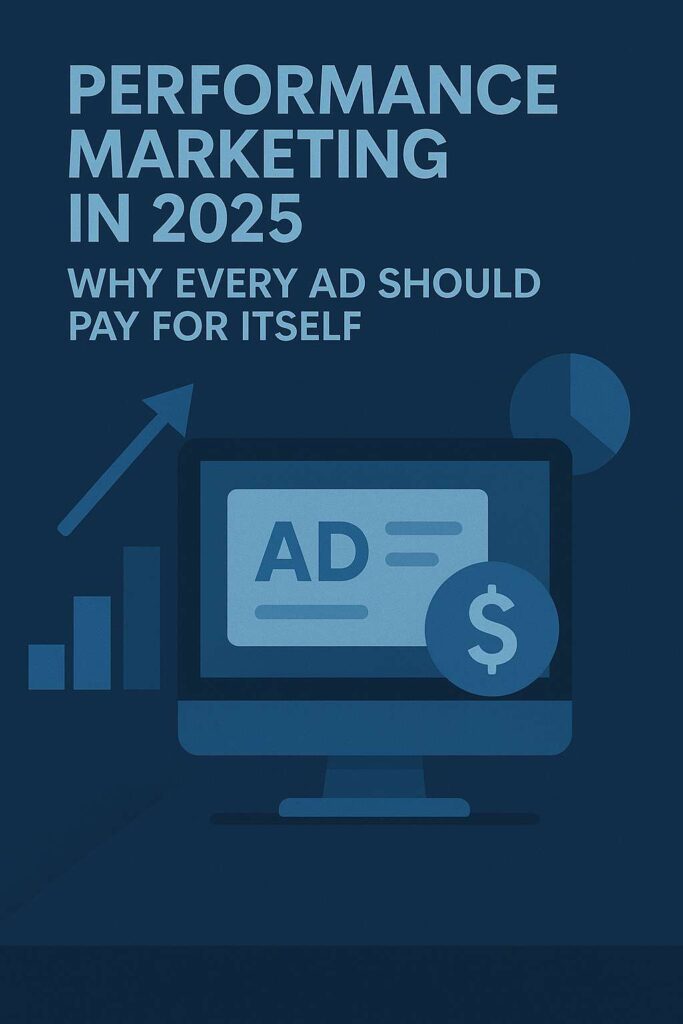

Introduction
The time has passed when we could throw money into ads and hope they worked. In 2025, digital marketers are under greater scrutiny than ever to demonstrate ROI—fast. This is why performance marketing has become the cornerstone of digital marketing.
No matter if you are spending ₹500 or ₹5 lakh, every click, lead, and sale should be trackable. In this blog we will explore what performance marketing looks like in 2025, how we got here, and how you can ensure that every ad pays for itself.
What is Performance Marketing?
Performance marketing is a data-driven method of advertising whereby brands only pay for completed actions such as:
- Clicks (PPC)
- Leads
- App installs
- Sales or conversions
It takes the concept of traditional advertising and tosses it out the window. Instead of paying to be seen, you pay for results — and that’s exactly how Digmora drives smarter performance for your brand.
In 2025, performance marketing has grown well beyond Google Ads or Facebook campaigns, including:
- Affiliate marketing
- Influencer work with cost-per-sale (CPS) models
- Connected TV (CTV) ads with measurable clicks
- Real-time bidding across platforms using AI optimization
Why Performance Marketing is the Future by 2025
1. Budget Accountability
Post-pandemic, marketing budgets are going to get tighter. With increasing competition, brands must prove success against ad spend. Performance marketing provides complete transparency from ad spend to revenue.
2. Smarter Ad Tech
AI tools now automatically optimize campaigns in real time, adjusting the bids, targeting the ads, and creative elements based on performance.
3. Model Attribution
Ad attribution models now allow us to see how a TikTok ad led to a Google search, which ultimately resulted in a purchase. Full funnel attribution!
4. Zero-waste Budgets
You only pay for completed actions, meaning you waste less media and every rupee works toward a goal.
Key Channels in Performance Marketing (2025 Edition)
🔍 1. Paid Search (Google, Bing, AI-based engines)
Search ads remain a foundation. Now with AI, keyword targeting is faster and more intelligent.
📱 2. Paid Social (Instagram, TikTok, Facebook)
Short-form video dominates! Dynamic product ads with instant purchase buttons are exploding.
🤝 3. Affiliate Marketing
Brands pay bloggers, review sites, or niche influencers only when consumers convert.
🎯 4. Programmatic Advertising
Real-time bidding tools use machine learning to target placements and monetize content at scale—spending smarter.
📺 5. Connected TV (CTV)
Track last-click conversions from YouTube TV ads to app installs or purchases, changing how we view TV advertising.
Performance Metrics You Must Track in 2025
“If you’re not measuring it, you’re guessing.”
| Metric | Why It Matters |
| CPA (Cost per Acquisition) | Are you getting value for money on each conversion? |
| ROAS (Return on Ad Spend) | The gold metric—how much are you earning for every ₹1 spent? |
| CTR (Click-Through Rate) | Tells you if your ad is resonating. |
| Conversion Rate | Measures how well your landing page or funnel is working. |
| LTV (Customer Lifetime Value) | Helps determine how much you can afford to spend to acquire a customer. |
Brands That Are Killing It
🛒 Myntra
Their team uses AI-driven dynamic product ads on Facebook and Instagram, retargeting based on behavior, delivering a 6x ROAS during seasonal sales.
🚀 Zerodha
Grew entirely via a referral-based affiliate program—they only pay partners when users trade. It’s like free scaling without upfront costs.
🍕 Domino’s
Utilizes Google Ads + programmatic tools to run geo-targeted offers near their stores—only paying when a conversion happens.
Performance Marketing Tips for 2025
🧠 1. Focus on First-party Data
With third-party cookies fading, owning your data is now critical. Use email lists, CRM data, loyalty apps for retargeting.
⚙️ 2. Automate, But Keep An Eye
Let AI optimize, but keep watching the data—humans are still needed to provide context.
🎨 3. Test Your Creatives Religiously
A/B testing is a must. Constantly test headlines, CTAs, video formats—no exceptions.
📈 4. Align Marketing + Sales Departments
Sales and marketing must share goals. Leads are wasted if the sales team isn’t converting.
📊 5. Use Multi-Touch Attribution Tools
Understand the full customer journey using tools like Triple Whale, HubSpot, and GA4.
Common Pitfalls to Avoid
- Obsessing over vanity metrics (likes, reach ≠ revenue)
- Running campaigns without clear conversion goals
- Ignoring the post-click experience (e.g., slow landing pages)
- Not optimizing for mobile (where most traffic now lives)
Final Thoughts: Make Every Rupee Count
Performance marketing isn’t just a tactic; it’s a mindset.
In 2025, marketers will be expected to prove the value of every campaign. With the right tools, clear goals, and constant optimization, your ads won’t just be viewed—they’ll convert.
So the next time you hit “publish” on a campaign, ask yourself:
Will this ad pay for itself?
If the answer is no, then you need to rethink it.
